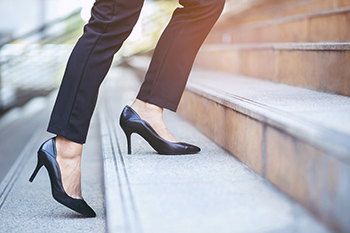
Research has shown that one third of women who frequently wear high heels have fallen while wearing them. High heels may be the cause of foot problems in women, and some may suffer permanent damage. The foot condition that is called hammertoe may develop, and this may happen when the toes do not have adequate room to move freely in. Additionally, many women can get ingrown toenails, which can occur when the toe rubs against the top of the shoe. The foot can be forced into an unnatural shape when the heels are two inches or higher, and this may alter the foot structure. The foot may slide forward, causing the weight of the body to redistribute, and the body may tilt forward. This can wreak havoc on the overall body, and the posture may be negatively affected. There are many women who enjoy wearing high heels, and there are shoes that can be worn that are safer on the feet and body. These can include choosing shoes that have a lower heel, wearing soft insoles inside the shoe, and alternating shoes worn from one day to the next. If you would like additional information about how high heels can affect the feet, please consult with a podiatrist who can answer any questions you may have.
High heels have a history of causing foot and ankle problems. If you have any concerns about your feet or ankles, contact one of our podiatrists from The Podiatry Center, PC. Our doctors can provide the care you need to keep you pain-free and on your feet.
Effects of High Heels on the Feet
High heels are popular shoes among women because of their many styles and societal appeal. Despite this, high heels can still cause many health problems if worn too frequently.
Which Parts of My Body Will Be Affected by High Heels?
- Ankle Joints
- Achilles Tendon – May shorten and stiffen with prolonged wear
- Balls of the Feet
- Knees – Heels cause the knees to bend constantly, creating stress on them
- Back – They decrease the spine’s ability to absorb shock, which may lead to back pain. The vertebrae of the lower back may compress.
What Kinds of Foot Problems Can Develop from Wearing High Heels?
- Corns
- Calluses
- Hammertoe
- Bunions
- Morton’s Neuroma
- Plantar Fasciitis
How Can I Still Wear High Heels and Maintain Foot Health?
If you want to wear high heeled shoes, make sure that you are not wearing them every day, as this will help prevent long term physical problems. Try wearing thicker heels as opposed to stilettos to distribute weight more evenly across the feet. Always make sure you are wearing the proper shoes for the right occasion, such as sneakers for exercising. If you walk to work, try carrying your heels with you and changing into them once you arrive at work. Adding inserts to your heels can help cushion your feet and absorb shock. Full foot inserts or metatarsal pads are available.
If you have any questions please feel free to contact our office located in Millburn, NJ . We offer the newest diagnostic and treatment technologies for all your foot and ankle needs.
